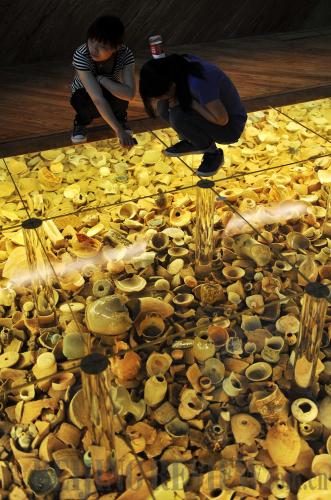|
 |
|
ANCIENT WARES: Tourists view broken shards of pottery at the Tongguan Kiln National Archaeological Park in Wangcheng District, Changsha, Hunan Province, on June 5, 2012 (XINHUA) |
Lately, agritourism has sprouted as a hot topic among farmers across Wangcheng District in Changsha, capital of central China's Hunan Province. They recently received a delegation of diplomats and mayors from across the world, treating guests to local tea, fruit and snacks. The visitors were also impressed by the area's fascinating scenery and local culture.
On October 24, with the theme Draw on Urban-Rural Integration Models to Explore New Urban-Rural Relationship, the First Summit of the World Agritourism Development Forum was launched in Wangcheng, with 46 diplomats and representatives from across the world attending the four-day event.
"We will take this summit as an opportunity to promote agritourism, as a means to accelerate urban-rural integration, and thus enable urban residents to enjoy the beauty and peace of the countryside, and rural residents' modern life," said Yi Lianhong, the city's Party chief.
His comment was echoed by diplomats. "Let's start here to promote agritourism across the world," said Lithuanian Ambassador to China Lina Antanaviciene.
Rural life
"I have great fun in the countryside. On the weekends, I often drive and take my family to Wangcheng District. We eat and play at the farmer's market. The vegetables are freshly picked from the field. And the fish is from the pond nearby. They taste great," said Tian Ming, an engineer at a machinery company in the city.
"Besides the food, we also play cards in the courtyard, smelling the green trees and beautiful flowers. It is wonderful," he said.
Indeed, more urban residents now choose to tour the countryside on weekends or during holidays. After only a short trip, the city of steel and cement is left behind, and a rural landscape with fresh air and good scenery abounds.
Take Tian for instance, it only takes him 20 minutes to drive to Wangcheng from the downtown area. Located in the northwest of the city, the district covers an area of 969 square km with an estimated population of 536,800. It is the first choice of urban residents when they want to tour the country.
"A friend once jokingly told me that villagers want to go to town, while people in town now want to go to villages. I believe that in the future, more urban residents will choose to experience life in the countryside," China's former Foreign Minister Li Zhaoxing said during the summit on October 25.
Indeed, this has already become a more and more popular lifestyle among Chinese urban residents amid its ongoing urbanization. It is against this backdrop that agritourism has surged in recent years.
"Agritourism is a new and comprehensive model, which operates via the commoditization of rural landscapes, rural life and folk culture. It attracts tourists to eat, live, travel, entertain and shop in rural areas," said Li Shiqiu, Vice Mayor of Changsha. "It meets the urban aspiration for rural life."
"Agritourism is a good way of leisure, and means a higher level of consumption. To pick fruit in the orchard, vegetables in the field, and fish in a pond is quite different from buying at a market. The former creates a good sense of happiness," said Yin Chengjie, former Executive Vice Minister of Agriculture, who also participated in the summit.
Yin's opinion is shared by all attendants. "It's a good option to develop agritourism. People can see the beautiful landscape and enjoy culture. In Peru, we are also strengthening efforts in this field," said Carmen Azurin, Minister of Peru to China.
"We still have a way to go. For instance, in Western and Eastern European countries, agritourism is very diversified. There is much to learn," Yin said.
Aspiration regarding agritourism was echoed by Yuan Longping, the Father of Hybrid Rice, who has helped solved the food shortage problem in China.
"My dream is not only about feeding people all over the world, but also giving full play to the multiple functions of agriculture, including tourism, education and recreation on the premise of ensuring grain security," said Yuan.
Cultural flavor
Indeed, culture plays an increasingly significant role in agritourism. A good reason for the popularity of Wangcheng as a destination is its rich traditions.
In addition to natural rural landscapes, well-developed eco-farms and eco-gardens, it has several ancient towns and pottery kilns, which have all been developed for tourists.
The ancient Tongguan Kiln was an important base of production during the Tang Dynasty (618-907). A large number of color-glazed pottery was unearthed here in 1965 and 1978. Decorated with green-colored patterns depicting human figures, animals, plants and natural landscapes, these items represent the excellent craftsmanship of this period.
| 